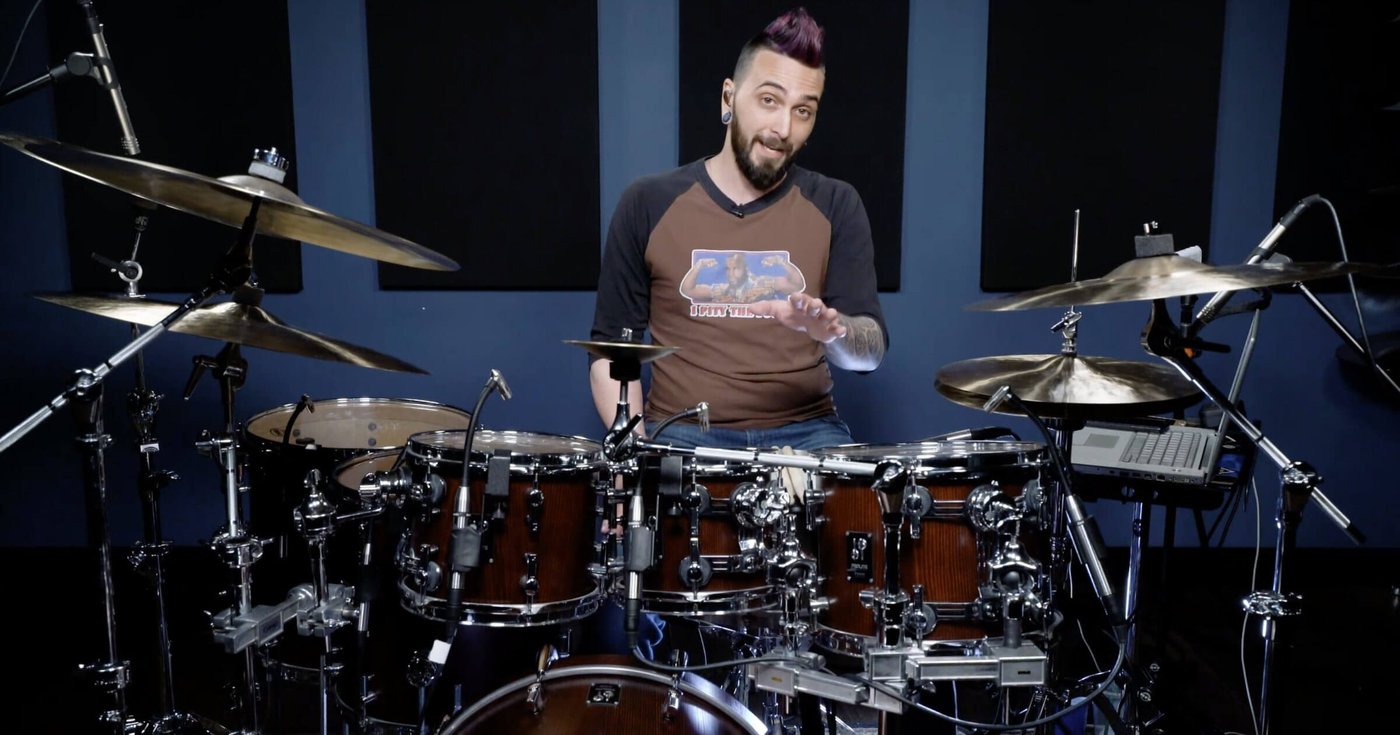
Here are 10 intermediate drum beats to help you get out of your beginner’s rut. Each one will use basic concepts that you might recognize from beginner grooves you’ve played before, but will have a little twist that you might’ve never encountered.
While you’re learning and practicing these beats, remember to start slow, stay relaxed, and know that repetition is key. Let’s jump right into it!
(Not sure if you’re ready to move from beginner drum beats to intermediate drumming? Check out the beginner’s test here. )

This first drum beat takes a basic rock beat and replaces the snare hits with flams. Since flams require both sticks to play, we’ll be coming off the hi-hat for each one. We’ll be playing right hand flams, so keep your left hand nice and close to the snare drum throughout the whole groove!

The biggest twist for this beat is we’ll be playing NO kick on count one. This might feel weird at first since the kick drum helps you find your spot and keeps you anchored.

The first thing to tackle with this beat is the kick drum pattern. We’ll be playing the kick drum on all four quarter notes with a fifth on the “and” of count four. Once you have that down, focus on adding the hi-hats next, and finally the snare hits. Work on each part individually before you add it all together.

You’ve most likely experimented with two-handed sixteenth note beats, but today we’re going to try playing the hi-hat notes with one hand only. Start super slow with this! The biggest challenge is lining up the kick and snare hits evenly with your hi-hats. You don’t want any flams here.

Here’s your very first latin beat! This specific pattern is called the “3-2 Clave”, meaning there are three notes in the first bar and two notes in the second bar. Your feet will be playing a repeated pattern (also called an ostinato) consisting of a hi-hat and two kick drums. Your right hand will be playing eighth notes on your ride cymbal, and your left hand will be playing a cross-stick on the snare drum. This is a tricky one, so watch the video above to get a demonstration.
(Click here if you’ve never played a Bossa Nova before)

This is the first groove we’ll be covering that features ghost notes. Start by isolating the two hands and ignore the kick drum. Once you’re okay with that, slowly add in each kick drum.

“Linear” means that no two limbs are playing at the same time. This drum beat is similar to the previous one with a few minor changes. This pattern also makes a great intermediate drum fill.

This is the only triplet-based groove we’ll be learning today. This one might look super complicated at first glance, but once you have the feel down, it’s not nearly as bad as you might think. If you’re confused by the sheet music, watch the video to get a good audible example of what it sounds like. Watch legends like Bernard Purdie play a shuffle to really nail the feel.

Note that count four is played on the floor tom opposed to the snare drum. The biggest challenge in this beat is closing the hi-hat, hitting the floor tom, and hitting the ride cymbal all at the exact same time. This pattern has a Carter Beauford (Dave Matthews Band) vibe – hence the name!

Everything we’ve played up until this point has been in 4/4 time, meaning four quarter notes per bar. This one is in 7/8, meaning there are seven eighth notes per bar. Confused? Start with 4/4 and take away one eighth note! If you’re new to odd time, check out this 8 minute lesson on odd time grooves.
Lesson Index:
0:49 – 1. Flams
7:27 – 2. No kick on “1”
13:13 – 3. Up-beat
18:32 – 4. One-handed sixteenths
25:06 – 5. Bossa nova
36:20 – 6. The “kindadiddle”
41:33 – 7. Linear
46:25 – 8. 16-note shuffle
51:32 – 9. The Carter Beauford
59:30 – 10. Odd time – 7/8
Ready for something more advanced? Check out this lesson on advanced drum patterns.
Aaron Edgar is a dynamic and innovative drummer renowned for his technical prowess and creative approach. With a career spanning over a quarter century, he has significantly impacted the drumming community as an educator, performer, and author. His work with the progressive metal band Third Ion showcases his ability to blend intricate rhythms with powerful grooves. Aaron's contributions to drumming education are extensive, including over a dozen years at Drumeo, his role as a columnist for Modern Drummer, and his instructional book "Progressive Drumming Essentials" Additionally, he served as Editor In Chief of Drums Etc. magazine and is a sought-after clinician worldwide. Aaron's passion and dedication continue to inspire drummers of all levels, solidifying his place as a leading figure in modern drumming.


By signing up you’ll also receive our ongoing free lessons and special offers. Don’t worry, we value your privacy and you can unsubscribe at any time.
We use cookies for traffic data and advertising. Cookie Policy »